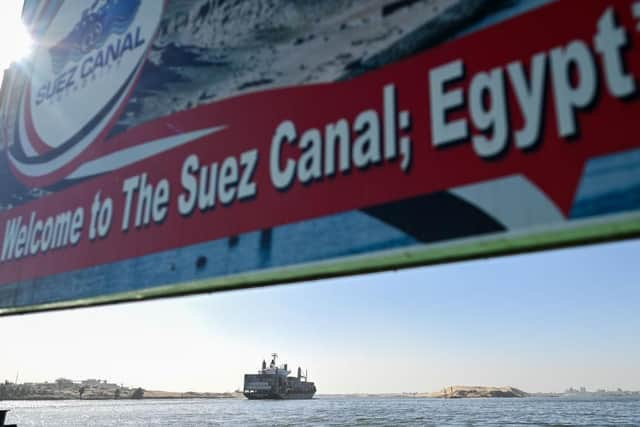Yemen bombings: Why is the Red sea being targeted by Houthi rebels? Will prices in shops increase due to attacks on ships in the Red Sea?
A US-led group attacked Houthi rebel sites after the group launched a spate of attacks on cargo ships in the Red Sea in recent weeks.
But what will the effect be on consumer prices and retailers’ ability to obtain goods usually shipped from Asia?
What is happening in the Red Sea?


Advertisement
Hide AdAdvertisement
Hide AdThe UK and US hit more than a dozen sites used by the Houthi rebels in a massive retaliatory strike on Thursday last week after a spate of 27 attacks on shipping since November.
The Islamist group, based in Yemen, claims it began striking a narrow strip of sea between Yemen and east Africa, which is a key international trade route, in a bid to end Israel’s air and ground offensive against Hamas.
The Shia militant group is allied to Tehran, as are Hamas and Hezbollah, and seeks to reduce western influence in the Middle East.
Why is the Bab El-Mandeb Strait and the Suez Canal such a key trade route?
Geography. The Bab El-Mandez Strait is a 20-mile-wide, 70-mile long, narrow passage of water between the Horn of Africa and the southern tip of the Arabian Peninsula that forms the southern entrance to the Red Sea from the Gulf of Aden.
Several billion tonnes of cargo passes along this route every year, making it one of the most critical maritime routes enabling global trade, according to the International Maritime Organization.
What has the impact of the conflict been on trade?
Some owners of shipping containers, such as Maersk and Hapag-Lloyd, have moved their vessels to a longer route around Africa's Cape of Good Hope rather than through the Bab El-Mandeb Strait and Suez Canal in the wake of increased attacks in December.
This is a costly decision, with the route taking on average ten days longer and costing around $1 million [£790,000] extra in fuel costs for each one-way trip between Asia and Europe.
Some companies, including Tesla, Next and Ikea, have already said they are experiencing delays on goods arriving from Asia into Europe. Tesla has had to stop production at its factory in Germany after being unable to obtain components from Europe.
Advertisement
Hide AdAdvertisement
Hide AdAs a result of the longer journeys and restricted trips, container shipping rates for key global trade routes have rocketed.
Shipping insurance is also rising. Insurers charge based on risk and if the risk of a ship passing through the Suez Canal is higher as there is an increased likelihood it could be attacked, the cost of insurance will go up.
What will the impact be for consumers in the UK?
These added costs for retailers are all likely to ultimately be ultimately passed down to the consumer.
The British Retail Consortium has already warned the disruption could have a knock-on effect on product availability and prices in the UK.
Chief executive Helen Dickinson said this was "as a result of higher transportation and shipping insurance costs". "Over the coming months, some goods will take longer to be shipped," she said.
Supermarket Lidl has also cited concerns, sparking fears that recently-stabilised food prices could once again be set to soar.
Comments
Want to join the conversation? Please or to comment on this article.
